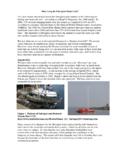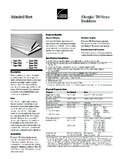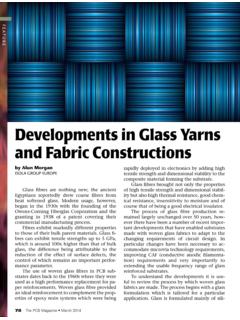Transcription of Illinois Settlement Pitfalls - novackmacey.com
1 Illinois Settlement Pitfalls By Timothy Miller Settlements in Illinois can pose significant Pitfalls for lawyers practicing in Illinois . Almost all litigators are familiar with the rules of evidence and procedure that govern trials. Yet, most lawsuits never to go trial, nor are most lawsuits resolved by summary judgment or some other dispositive action. Instead, most cases are resolved by settlements negotiated by the parties' attorneys. Settlements are documented by written Settlement agreements drafted by attorneys, many of whom are not as familiar with the "rules" of Settlement as they are with the rules of evidence. Written Settlement agreements should reflect the parties' agreement and intent. But written Settlement agreements also should protect against unintended consequences. In Illinois , there are some significant Pitfalls associated with Settlement agreements.
2 For example, Illinois law differs from federal law with respect to the admissibility of evidence of statements made during Settlement negotiations. A litigator unaware of this difference might say something (or fail to advise his client not to say something) that can come back to hurt the client if the case does not settle. Other Pitfalls can lead to the release of defendants or potential defendants whom the client did not intend to let off the hook. A few of these traps for the unwary will be discussed in the remainder of this article. Admissions in Settlement Negotiations Many litigators assume that the statements that they or their clients make in Settlement negotiations are inadmissible in evidence if the case does not settle. And, in federal court, that assumption is usually correct. Federal Rule of Evidence 408 provides that "conduct or statements made in compromise negotiations regarding the claims" are not admissible to prove liability for, invalidity of, or amount of a claim.
3 Or to impeach through a prior inconsistent Illinois law, however, is somewhat different, and there is a risk that a statement made in Settlement negotiations would be admitted into evidence. In Skonberg v Owens-Corning Fiberglas Corp., 215 Ill. App. 3d 735, 745, 576 28, 34 (1st Dist. 1991), the court held that "[e]vidence of offers of Settlement or compromise are ordinarily inadmissible .. , but admissions of fact are not excluded simply because they are made in the course of negotiations." In Stathis v. Gelderman, Inc., 295 Ill. App. 3d 844, 861, 692 798, 810 (1st Dist. 1998), one party was allowed to describe to the jury Settlement negotiations that "did not constitute an admission of liability" because the court deemed the discussions relevant to a disputed issue in the case. The other litigant was undoubtedly disappointed that the jury was allowed to hear that he had been willing to voluntarily pay something to settle.
4 See also, Niehaus v. Merrill Lynch Pierce, Fenner & Smith, Inc., 143 Ill. App. 3d 444, 450, 492 1356, 1360 (1st Dist. 1986). There is Illinois authority that takes a broader view of the inadmissibility of statements made during Settlement discussions. See, , Liberty Mut. Ins. Co. v. Am. Home Assurance Co., No. 1-05-2441, 2006 Ill. App. LEXIS998 (1st Dist. Nov. 2, 2006) ("As a general rule, matters concerning settlements and negotiations are not admissible"). Given the uncertainty in Illinois law, however, one cannot be confident that Settlement negotiations will not be admitted during a subsequent trial. There are at least two ways that a lawyer can avoid statements made in negotiations from coming back to haunt a client. First, and most importantly, do not make them and tell your client not to make them. If no admissions are made, nobody will need to decide whether they are admissible in evidence.
5 This is the safest way to approach the issue. A second approach is to precede any Settlement negotiations with a written agreement between the parties stating that the negotiations and any statements made in the course of Settlement discussions are inadmissible for any purpose. The following language likely would suffice: All such meetings, negotiations, and discussions shall be considered for Settlement purposes only, and nothing said during such meetings, negotiations, or discussions, nor communications or documents generated as a result of such meetings, negotiations, or discussions, shall be offered or admitted into evidence for any purpose at any proceeding, or inquired or testified about at any deposition in any pending or future litigation or arbitration between or among any of the parties; provided, however, that information otherwise discoverable in the absence of such meetings, negotiations, or discussions shall not be precluded from being discovered merely because the meetings, negotiations or discussions occurred or by reason of anything said or raised thereat.
6 Although such agreements are common, there does not appear to be any Illinois authority addressing their validity. Thus, even if such an agreement is executed, the safest course is not to say anything that you would not want repeated in court if the Settlement discussions fail. Reliance on Statements in Negotiations A lawyer also should avoid having his or her statements come back to hurt a client if the case does settle. If a written Settlement agreement does not contain strong non-reliance and integration clauses, it is entirely possible that statements made during Settlement negotiations could form the basis for future fraud claims. Many things are said in Settlement negotiations, including statements by lawyers and their clients that are not true. Sometimes, truthful things are said that are later perceived as having been untrue.
7 Sometimes people don't remember what was said, and sometimes people lie about what was said. To protect clients from subsequent claims that Settlement agreements were fraudulently induced, strong integration and non-reliance clauses should be included in all Settlement agreements. This means that, if a client is relying on a specific representation of fact, the Settlement agreement must repeat the representation and the other party warrant its truth. In Tirapelli v. Advanced Equities, Inc., 351 Ill. App. 3d 450, 453, 813 1138, 1140-1141 (1st Dist. 2004), the court considered a securities fraud claim based on an alleged oral misrepresentation. The written sale document, however, contained non-reliance and integration clauses: [T]he undersigned has relied solely upon the materials made available to the undersigned at the undersigned's request and independent investigations made by the undersigned in making the decision to purchase the Preferred Membership Interests subscribed for herein, and acknowledges that no representations or warranties (oral or written), have been made to the undersigned with respect thereto.
8 The Subscription Documents constitute the entire agreement among the parties hereto with respect to the subject matter hereof. 351 Ill. App. 3d at 453. Relying on these two provisions, the appellate court affirmed the trial court's grant of summary judgment. It held that, in light of the non-reliance clause, the plaintiff's reliance on an oral representation was unreasonable. 351 Ill. App. 3d at 452. In contrast to Tirapelli, in Astor Chauffeured Limousine Co. v. Runnfeldt Investment Corp., 910 1540, 1545-1546 (7th Cir. 1990), the court allowed a fraud claim based on an oral misrepresentation to go forward, where a written contract contained a "wimpy" integration clause that made no reference to prior representations. The lesson is clear: Settlement agreements should include strong integration and non-reliance clauses.
9 Agreements containing even broader provisions than those at issue in Tirapelli are possible. For example, the following language would seem to make it absolutely clear that a subsequent fraud claim should not be allowed. This Release Agreement constitutes and represents the complete and entire agreement among the Parties. This Release Agreement merges and supersedes any and all other prior agreements, discussions, negotiations, and communications among the Parties. The Parties acknowledge and expressly represent and warrant that they have relied solely upon their own judgment, together with advice of counsel, when deciding whether to enter into this Agreement. Each Party further agrees, acknowledges and expressly warrants that no information, statement, promise, representation, warranty, condition, inducement, or agreement of any kind, whether oral or written, made by or on behalf of any other Party shall be, or has been, relied upon by it unless specifically contained and incorporated herein.
10 Scope of Release Most Settlement agreements contain release language, but releases are fraught with peril. For example, many lawyers have a vague recollection that Settlement agreements once were drafted with covenants not to sue instead of releases. And some lawyers even know that settlements were drafted this way because a covenant not to sue was deemed not to fall within the "release one, release all" rule. But many lawyers believe that the common law rule that a release of one wrongdoer releases all wrongdoers has been abrogated by statute. This is partially correct. By statute, Illinois has abrogated the common law rule that a release of one joint tortfeasor releases all tortfeasors. See 740 ILCS 100/2(c). What many lawyers do not recognize is that this statute applies only to tortfeasors. As a result, the common law rule that an unqualified release of one who caused a monetary loss precludes a claim against any other parties who caused the loss continues to apply to, for example, co-obligors on a contract and to claims for joint breaches of fiduciary duty.








